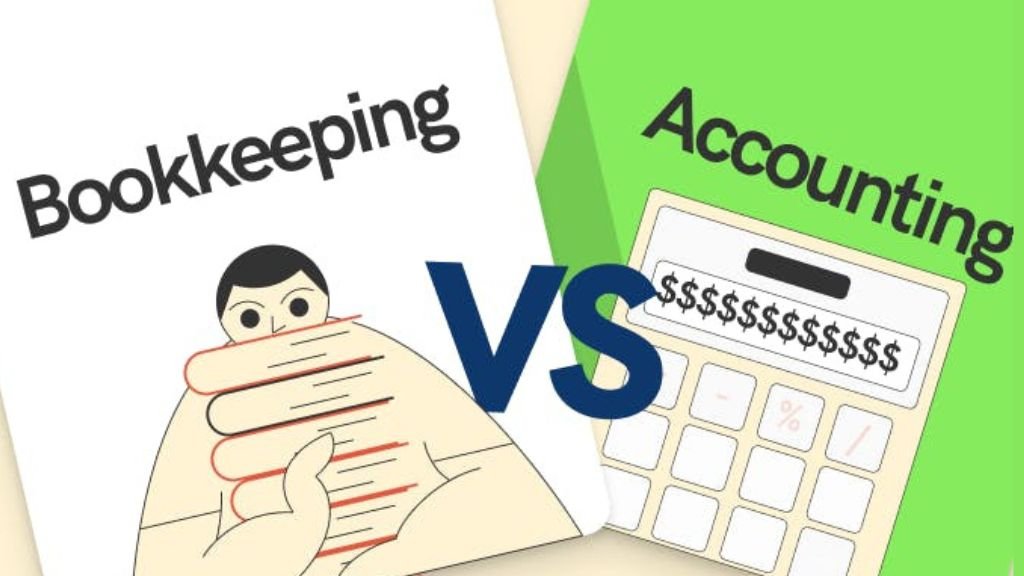In the world of finance, understanding the difference between accounting and bookkeeping is crucial for any business owner. While both functions are essential for effective financial management, they serve distinct purposes and require different skill sets. Bookkeeping focuses on the accurate recording of financial transactions, laying the groundwork for financial data. In contrast, accounting involves analyzing this data to provide insights and strategic recommendations.
For businesses looking to streamline these processes, professional services can be invaluable. Learn more about how expert solutions can enhance your financial management by visiting Accentor Solutions. In this article, we will explore the key differences between accounting and bookkeeping, their roles in financial management, and why both are vital for the success of your business.
Table of Contents
ToggleWhat Is Bookkeeping?
Bookkeeping is the foundation of your business’s financial management. It involves the daily recording of financial transactions, such as sales, purchases, payments, and receipts. Think of bookkeeping as the groundwork that ensures all financial activities are accurately documented. A bookkeeper handles tasks such as:
- Recording sales, purchases, and expenses
- Posting debits and credits in the ledger
- Maintaining and balancing financial ledgers
- Generating invoices for clients
- Preparing payroll for employees
- Creating basic financial reports, such as cash flow statements and balance sheets
This daily tracking is essential for maintaining accurate records that accountants later use to analyze a business’s financial performance.
The Role of a Bookkeeper

A bookkeeper’s role is to keep everything organized and up-to-date. Although formal certifications are not mandatory for a bookkeeper, attention to detail and a solid understanding of financial concepts are essential. Using tools like QuickBooks, Xero, or other bookkeeping services software can significantly simplify the process, especially for small and medium-sized businesses.
The general ledger, where all transactions are recorded, forms the core of bookkeeping. Depending on the complexity of the business and the volume of transactions, bookkeeping can range from relatively straightforward to more complex systems that involve double-entry bookkeeping. By keeping the company’s financial data well-organized, bookkeepers ensure that accountants have the information they need to provide in-depth financial analysis.
The Role of Bookkeeping in Financial Management
Bookkeeping plays a crucial role in financial management by ensuring accurate and up-to-date records. Here’s how it contributes:
Improved Accuracy
Accurate bookkeeping minimizes errors and ensures that all financial transactions are documented. This accuracy is vital for decision-making and financial reporting.
Informed Decision-Making
With organized financial data, business owners can analyze their income and expenses, allowing them to make informed decisions about budgeting and spending. For instance, understanding financial forecasting can significantly enhance this decision-making process. Check out this beginner’s guide to financial forecasting.
Time Savings
When bookkeeping is done correctly, it saves time during tax season and audits. Having organized records means less stress and fewer chances of missing important financial information.
Financial Compliance
Proper bookkeeping helps ensure compliance with financial regulations and tax laws. Accurate records make it easier to file taxes and prepare for audits.
What Is Accounting?

While bookkeeping focuses on recording day-to-day transactions, accounting takes those records and processes them further. Accounting is a more specialized discipline that involves interpreting, analyzing, and summarizing financial data to create reports that offer valuable insights into a company’s overall financial health. An accountant’s tasks may include:
- Preparing financial statements such as income statements, balance sheets, and cash flow reports
- Conducting audits to ensure compliance with laws and regulations
- Analyzing operational costs and trends
- Advising on tax planning and preparing tax returns
- Developing financial strategies and budgets for long-term growth
In contrast to bookkeeping, accounting requires higher-level expertise. Many accountants hold formal qualifications, such as being a Certified Public Accountant (CPA), which allows them to provide more complex financial services and business advice.
The Role of Accounting in Financial Management
Accounting is essential for strategic planning and long-term financial health. Here’s how it supports financial management:
Strategic Planning
Accountants analyze financial data to identify trends and forecast future performance. This information is critical for setting financial goals and planning for growth.
Cost Management: A Look at Bookkeeping vs. Accounting
By examining expenses, accountants can identify areas where a business can reduce costs, ultimately improving profitability. For small businesses, implementing effective digital marketing strategies can also lead to cost savings. Discover more about these strategies here.
Risk Management
Accountants assess financial risks and develop strategies to mitigate them. This includes ensuring adequate cash flow and identifying potential financial pitfalls.
Performance Measurement
Through financial analysis, accountants provide insights into the business’s performance. This helps business owners understand where they stand financially and where improvements are needed.
Bookkeeping vs. Accounting: Key Differences

While accounting and bookkeeping are closely related, they differ in several key areas:
| Key Differences | Bookkeeping | Accounting |
|---|---|---|
| Focus and Scope | Primarily concerned with accurately and consistently recording financial transactions; lays the foundation for financial data. | Involves analyzing financial data to provide insights and recommendations; encompasses broader financial management. |
| Complexity of Tasks | Generally straightforward and routine tasks, including data entry, account reconciliation, and report generation. | More complex tasks requiring a deeper understanding of financial principles, including financial analysis, strategic planning, and decision-making. |
| Required Skills and Qualifications | Proficiency in accounting software and attention to detail; formal qualifications are not always necessary. | Typically requires a degree in accounting or finance; may hold certifications (like CPA) to demonstrate expertise. |
| Reporting and Insights | Focuses on generating basic financial reports reflecting the company’s current financial position. | Includes in-depth financial analysis and creation of detailed reports providing insights into profitability, cash flow, and potential areas for improvement. |
How Accounting and Bookkeeping Work Together?

Accounting and bookkeeping are interdependent processes. While a bookkeeper ensures all financial data is properly recorded and organized, an accountant uses this data to generate insights and strategies for business growth. Without accurate bookkeeping, accountants would not have the reliable data they need to conduct their analyses and offer sound financial advice.
In many businesses, bookkeepers and accountants work closely together to maintain smooth financial operations. For example, after the bookkeeper prepares reports like the balance sheet or income statement, the accountant reviews these documents to assess profitability, efficiency, and tax obligations. This collaboration ensures that business owners have a comprehensive view of their finances and can make informed decisions. You can also explore options like business process outsourcing (BPO) to streamline your operations.
Why Your Business Need Accounting and Bookkeeping Services?
At Accentor Solutions, we understand the importance of having both a solid bookkeeping foundation and expert accounting insights. Whether you’re running a small business or a large enterprise, having organized financial records and detailed analysis is key to success. Here’s why you should consider professional bookkeeping services and accounting support:
Accurate Financial Records
One of the primary functions of bookkeeping is to maintain accurate and up-to-date financial records. This involves recording all financial transactions, such as sales, expenses, and payments. Accurate records are crucial for:
- Having precise records simplifies tax preparation and ensures you meet your tax obligations on time, avoiding penalties and interest.
- Accurate records provide the foundation for generating reliable financial statements, helping you understand your business’s financial position.
Time and Cost Savings
Managing finances can be time-consuming, especially for small business owners who often juggle multiple responsibilities. By outsourcing accounting and bookkeeping services, you can:
- Free up your time to focus on growing your business, serving customers, and improving products or services.
- Hiring a full-time accountant can be expensive. Outsourcing allows you to access professional services without the overhead costs of employing a full-time staff member.
Enhanced Cash Flow Management
Effective cash flow management is critical for business sustainability. Accounting and bookkeeping services help you:
- Regular financial tracking enables you to see where your money is coming from and where it’s going, helping you maintain a positive cash flow.
- Understanding trends in income and expenses allows you to make proactive decisions about spending, investment, and savings.
Compliance with Regulations
Accounting and bookkeeping services provide access to professional expertise that can be invaluable for your business. This includes:
- Accountants can offer strategic financial advice, helping you make decisions that promote growth and sustainability.
- Understanding your financial position enables you to identify opportunities for expansion, investment, or cost-cutting.
Common Misconceptions Between Accounting and Bookkeeping

| Common Misconceptions | Clarification |
|---|---|
| Accounting and Bookkeeping Are the Same | While related, bookkeeping focuses on recording financial transactions, whereas accounting involves analyzing and interpreting that data for decision-making. |
| Bookkeepers Do Not Need Any Qualifications | While formal qualifications may not be mandatory, bookkeepers benefit from training in accounting principles and software to ensure accuracy and efficiency in their work. |
| Accounting Is Only About Taxes | Accounting encompasses a broader range of financial activities, including budgeting, forecasting, and financial analysis, beyond just tax preparation and compliance. |
| Only Large Businesses Need Accounting Services | Every business, regardless of size, can benefit from accounting services. Small businesses can especially gain from proper financial management to ensure growth and sustainability. |
| Bookkeeping Is Less Important Than Accounting | Both accounting and bookkeeping are essential; bookkeeping provides the foundation of accurate financial data, while accounting uses that data to inform strategic decisions. |
| You Can Handle Both Without Professional Help | While some business owners may attempt to manage accounting and bookkeeping themselves, professional expertise ensures accuracy, compliance, and strategic insight. |
| Bookkeeping Is a One-Time Task | Bookkeeping is an ongoing process that requires regular updates and reconciliations to maintain accurate financial records and support effective accounting practices. |
| Accounting Is Only for Financial Reporting | Accounting also involves strategic planning, performance evaluation, and operational support, providing insights that help businesses make informed decisions. |
How Technology Is Bridging the Gap?
In recent years, advancements in technology have blurred the lines between accounting and bookkeeping. Cloud-based accounting software now integrates bookkeeping tasks with accounting functions, allowing small businesses to manage much of their financial workflow from a single platform. These tools automate many repetitive tasks, such as invoicing, payroll, and tax calculations, while providing insights into a business’s financial health.
That said, while automation can improve efficiency, it doesn’t replace the expertise of professional bookkeepers and accountants. At Accentor Solutions, we combine the power of technology with personalized financial services to help your business grow.
Bothaccounting and bookkeeping are essential for maintaining the financial health of your business. Bookkeeping lays the groundwork by tracking every financial transaction, while accounting takes it a step further by analyzing and interpreting that data. Together, they form a powerful system that ensures your business operates smoothly and makes informed financial decisions.
Choosing the Right Financial Path for Your Business

Understanding the difference between accounting and bookkeeping is crucial for business owners. Depending on your business’s size and complexity, you may choose to manage these functions in-house or hire professionals.
If you’re just starting, you might handle bookkeeping yourself using simple software. As your business grows, consider hiring a professional bookkeeper and an accountant to ensure accurate financial management.
For more information on enhancing your business through effective management strategies, check out crafting a powerful online presence to boost your business.
Ready to Take Control of Your Finances?
Whether you need help managing day-to-day bookkeeping or require expert accounting advice, Accentor Solutions is here to help. Our team of experienced bookkeepers and accountants work together to ensure your business’s financial records are accurate, compliant, and optimized for growth.
With our bookkeeping services, you can stay on top of your financial transactions, and with our accounting expertise, we’ll help you make smart, data-driven decisions to improve your bottom line. Contact us today to learn more about how we can support your business’s financial success.
Frequently Asked Questions (FAQs)?
Bookkeeping involves the daily recording of financial transactions such as sales, purchases, and expenses. Accounting, on the other hand, is focused on analyzing and interpreting the data recorded by bookkeepers to provide insights, financial reports, and strategic advice.
Yes, both roles are important. A bookkeeper keeps your financial data organized, while an accountant uses that data to assess your financial health and guide important business decisions. Together, they ensure your finances are well-managed.
While bookkeeping software like QuickBooks or Xero can automate many tasks, it cannot fully replace the expertise of a professional bookkeeper. Bookkeepers ensure accuracy, handle complex financial records, and adapt to unique business needs that software alone cannot manage.
Any business, regardless of size, can benefit from professional bookkeeping services. Small and medium-sized businesses especially benefit by ensuring accurate financial records, maintaining compliance, and freeing up time to focus on core activities.
At Accentor Solutions, we offer comprehensive bookkeeping and accounting services to help manage your finances, ensure tax compliance, and provide insights for business growth. Our team combines technology with expert knowledge to give your business a competitive edge. Contact us to learn more.











